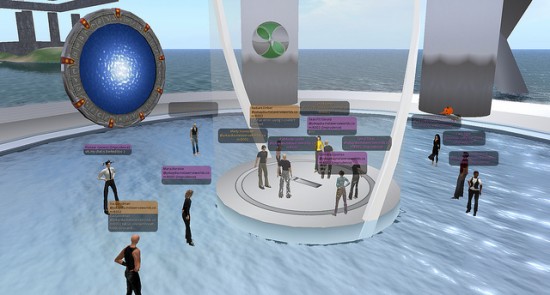Many grids today have hypergrid turned off, for fear that content will be taken from their grid to a less secure grid, copied, and distributed illegally.
OpenSim developers are working to create a hypergrid-wide permission system for content that will help abate this fear, and open more of the OpenSim universe to hypergrid travelers.

This week, hypergrid inventor Crista Lopes, professor of informatics at the University of California, Irvine, added a setting to OpenSim that would prohibit hypergrid visitors from taking content away with them.
“It removes their ability to take assets into their grids, even if the objects can be copied,” Lopes told Hypergrid Business.
The way it works is that you — or the hosting company running OpenSim for you — have to set the “OutboundPermission” setting to “False” in OpenSim’s HGInventoryAccessModule. The setting applies to all the regions running under that instance of OpenSim. Typically, each instance of OpenSim would handle between one and four regions, but it can go higher.
According to Lopes, this is just the first step towards having asset security on the hypergrid.
“I did it now because ScienceSim is planning a big event,” she said. “A lot more will be coming regarding these kinds of policies.”
How content is secured
There is no absolute guaranteed way to secure digital content. The highest degree of security available today is the closed grid. On grids like SpotOn3D, InWorldz, 3Rd Rock — and Second Life — all regions are hosted on grid-owned servers, residents cannot have “God powers,” there are no region exports in the form of OAR files, and there are no hypergrid teleports to other, less secure grids.
The lowest degree of security in OpenSim is on open grids such as OSGrid. Here, residents are able to connect regions that they host themselves, on their own servers, or even on home computers. This means that they have access to the underlying asset databases and can change the permission settings on objects. Residents who run their own regions can also give themselves “God powers,” which also allow permissions to be changed.
Many grids and OpenSim hosting providers also offer their customers the ability to get OAR exports — full downloads of everything on their regions, including landscapes, buildings and other objects, textures, and scripts. These OAR files can be used as a personal backup copy of a region, or to move a region from one grid or hosting provider to another. But OAR files can also be distributed. In fact, there is a website up that allows people to share OAR files — OpenSim Worlds.
Finally, hypergrid teleports allow users to take content from one grid — where they might not, say, have the ability to export OAR backups — to another grid, where they can.

The iTunes approach
To avoid content theft, many content creators are opening stores in closed grids such as InWorldz, where the level of content protection is as high as it can be. Namely, as high as in Second Life.
This isn’t 100 percent protection against content theft, however, as the presence of illegal copies of objects inside Second Life demonstrates.
As a result, some content creators are taking a different approach, counting on the fact that people are willing to pay reasonable prices for high-quality products if they are convenient and easy to find, the same way that the iTunes store sells music without digital rights management restrictions on it even though the same music might be available elsewhere — illegally — for free.
Commercial grids like AlphaTowne and GermanGrid, which use, respectively, the G$ and OMC multi-grid currencies, are embracing this approach. Both are hypergrid-enabled, and allow shoppers to come from anywhere else in OpenSim, buy products, and take them back to their home grids. This is particularly important for enterprise and education customer segments, since these groups are most likely to have their own, private grids, rather than be part of some larger social grid.
- OSgrid wiping its database on March 21: You have five weeks to save your stuff - February 15, 2025
- OpenSim activity up with the new year - January 15, 2025
- OpenSim land area, active users up for the holidays - December 15, 2024
